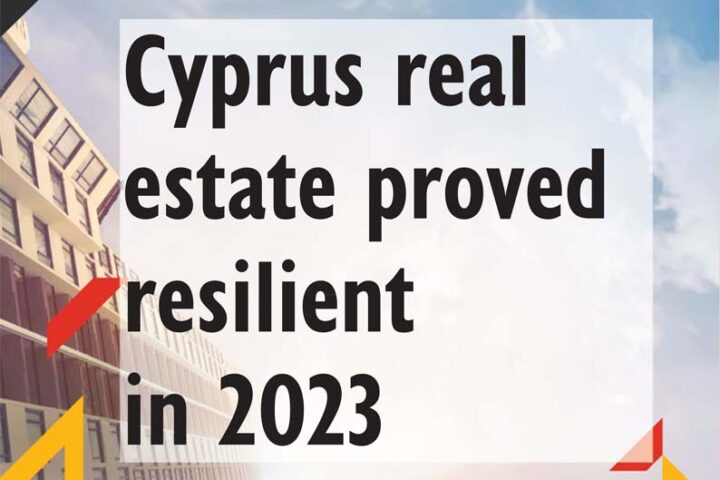Cyprus’ banking and real estate sectors will not be affected by a possible bubble from overheating of the residential market in the European Union, say local stakeholders.
In a recent survey carried out by the European Banking Authority, real estate in the majority of EU states has witnessed double-digit growth between Q1 2021 to Q1 2022, with the fastest in the Czech Republic (25%), Estonia (21%) and Lithuania (21%), while 15 other countries reported at least 10% increase in 2021.
The EBA published a thematic note on “residential real estate exposures of EU banks: risks and mitigants”.
As the report notes, EU banks reported more than €4.1 trln of loans and advances collateralised by residential immovable property.
This corresponds to 1/3 of all loans towards households and non-financial corporates.
Demand for housing has been robust in recent years, notes the EBA, adding that strong capital and liquidity positions of EU banks enabled them to fulfil this demand, expanding their exposures towards mortgage loans.
“At the same time, the supply of housing was unable to keep up with the demand due to a lack of housing investments in previous years, construction constraints, and supply-chain disruptions caused by the pandemic.
“As a result, house prices recorded high growth rates in many EU countries, which caused concerns of overheating markets,” said the EBA.
It warned the macroeconomic environment had deteriorated abruptly, and the probability of a recession had increased.
“High inflationary pressures and resulting increases in interest rates have driven up living costs without corresponding increases in income.
“This is a challenge, particularly for lower income and highly indebted households”.
The EBA is mostly concerned that an abrupt drop in prices of housing units coupled with rising default rates could pose a challenge for EU banks.
Almost a third of EU bank loans are mortgages.
In recent years, banks have significantly increased their exposure to this area.
While there are some early signs of deteriorating asset quality in mortgage portfolios, such risks have yet to materialise.
However, in Cyprus, local stakeholders feel the real estate and the banking sector will not feel the heat from a bubble bursting in the EU.
Late recovery
In comments to the Financial Mirror, Pavlos Loizou, CEO of Ask WiRE, said the Cypriot real estate sector has not followed the same recovery course as the rest of the bloc following the 2008 crisis, saving it from overheating.
“We could even say the island’s real estate market has not had the chance even to heat up, as recovery began much later than the rest of the Union,” said Loizou.
He explained that whereas the real estate markets in the Eurozone started recovering around 2011, the banking crisis in Cyprus in 2013 pushed recovery back several years.
“It wasn’t until 2016 that the real estate sector in Cyprus started recovering.”
This late recovery, as he explained, also meant that the island’s banks had started giving housing loans once again much later than the rest of the bloc, saving them from being overexposed.
“Another element is that Cyprus’ developers are no longer venturing into speculative projects, building many housing projects, which they hope to sell to expats or foreign investors.
“The market is mostly oriented towards existing local demand.”
George Mouskides, the Cyprus Property Owners Association chair, agreed that the market is far from overheated like in the rest of Europe.
“Sure, property prices have been pushed up, but this is mostly due to the increase of construction cost rather than the increase in demand,” said Mouskides.
As he argued, demand is at normal levels, with 10,000 to 12,000 annual transactions recorded in recent years.
“We have barely come close to demand recorded in 2009, just before the island’s housing crisis hit.
“The increase in house prices is cost-driven and will not crash if there is an abrupt drop in demand.
“I would go as far as to say that without the increase in the cost of building, the prices of houses in Cyprus could have dropped significantly in the past couple of years.
“I don’t see prices dropping in Cyprus for the next couple of years.”
In comments to the Financial Mirror, Ioannis Tirkides, Chief Economist at the Bank of Cyprus, said increases recorded in the sector have corrected the market than overheat it.
“Recent increases have corrected the market after the abrupt drop with the crisis in 2013,” said Tirkides.
Asked whether the increase in mortgage interests could distort the market, Tirkides said that although interest rates on mortgages could reach 5%, from 2.5% by the end of next year, this will not affect the initial capital needed to buy a house, but the cost to the buyer.
“This will not push prices upwards, blowing hot air into a possible bubble.
“It will definitely be making things harder for people to acquire new loans and to pay off their existing ones, but any fallout will be manageable”.
Tirkides also acknowledged that geopolitical uncertainty and the energy crisis weigh on consumer and business confidence.
Although employment rates remain high, these developments could affect demand for housing and property purchases.
He noted that just like all other crises before, this could lead to difficulties for consumers, “but the situation will definitely not come anywhere near the 2013 crisis”.










